Is Italy breaking up with you?
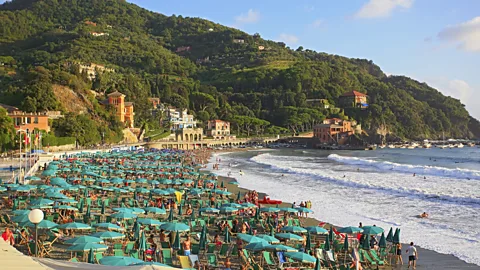 Getty Images
Getty ImagesThe centuries-old love affair between Italy and its many admirers is coming to a turning point, with the issues caused by overtourism creating a massive rift in the relationship.
Italy has been saying "no" a lot recently: no selfies in Portofino; no large cruise ships in Venice; no free entry for day-trippers; no tourist buses on Amalfi's seafront; no sitting on the Spanish steps in Rome… The list of small measures trying to curb overtourism is long and at times creative – consider for instance the fine of up to €2,500 for wearing flip flops on the Cinque Terre trails.
Since Italy has long been known as the country of love – and one of the world's most beloved travel destinations ever since young European men began embarking on the Grand Tour in the 17th Century – one might wonder if these series of small rejections are a signal of a change of heart.
In more melodramatic terms: is Italy breaking up with you – and by you, I mean you, tourists?
It seems obvious that il Bel Paese ("the beautiful country", as we Italians call our land) is reaching a turning point in its relationship with its numerous lovers – or is at least trying to establish some boundaries. "Americans ask us when Venice closes, as if it was a museum," says outraged activist Marco Gasparinetti, a proud defender of the amphibious nature of his hometown, a city that lives in a delicate balance between water and land and must be protected accordingly.
Gasparinetti believes that Venice's 50,000 residents (who may well find themselves outnumbered by up to 140,000 daily visitors) are "fed up".
"We must and can live from tourism, but we don't want to die from it," he says, acknowledging both the significant financial resource tourism represents as well as its negative impact on the environment, cost of living and quality of life.
At the beginning of May, an exasperated woman with a young child attacked some tourists on the Line 1 vaporetto heading to the Lido, making headlines in the local newspaper Il Gazzettino. Less than two weeks earlier, residents took to the streets and protested the €5 entry ticket, a measure imposed by the city of Venice as an experiment for 29 days, applicable to day trippers arriving before 17:00. The ticket has attracted criticism from citizen groups. It's a "red herring", says environmental scientist and activist Jane da Mosto; "useless" according to writer Marco D'Eramo ("5 euros? It's the cost of a coffee"); and is turning the city into a cheap "zoo or circus", adds Gasparinetti.
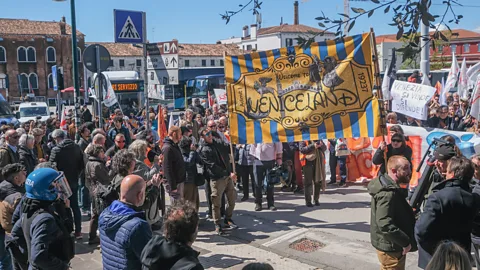 Getty Images
Getty ImagesTourism has grown incessantly in the years since Covid, and it presents a peculiar conundrum if not properly managed, according to Marina Lalli, president of Italy's National Federation of the Travel and Tourism Industry. "It becomes a lose-lose situation, both for tourists, who won't be able to fully enjoy the place they visit, and for residents, because costs increase and finding a home becomes a serious problem," she says, referring to the entire country, not only Venice.
The Cinque Terre National Park, for instance, welcomed four million visitors in 2023, an increase of one million from 2022. Francesco Villa, mayor of Vernazza, one of the most picturesque villages in Cinque Terre, says that they are glad to attract up to 2,500 daily tourists in a town that has only 750 residents because tourism has made them wealthy. But he also admits that very few residents leave their house and venture into town between 14:00 and 17:00. "We can still go for a walk out in the countryside or in our garden. It's not ideal, but we accept it because it is extremely beneficial in other ways," he says. The idyllic town of Vernazza also deals with a yearly average of two tons of waste per citizen, and the numbers are growing.
One of the Italian government's priorities is to increase tourism even further, and to "turn our heritage into income", says Minister for Tourism Daniela Santanchè, who doesn't think that there are too many tourists; rather that the industry needs to be better organised, better managed and more profitable. "In Italy very often things are free or at very, very low prices," she tells the BBC. "The Colosseum makes only a quarter of what the New York Museum of Natural History makes."
She also believes that Italy needs to promote its smaller towns and de-seasonalise so visitors won't only come in summer, but year round. This might prompt the question whether the future residents of Vernazza will ever be able to leave their homes – and if, in fact, country is being turned into a theme park. "People who say these things are only jealous of all the wonders of our country," answers Santanchè. "We are an open-air museum; we have the most important Unesco sites in the world." The minister also enumerates Italy's unparalleled culture, unique food, marvellous nature and 5,600 little borghi (charming historic villages), concluding by saying that "the world wants Italy, a lot".
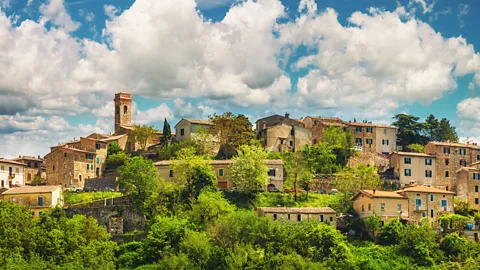 Getty Images
Getty ImagesAs an Italian, this statement about the world wanting my country so badly makes me slightly anxious; but I'm also aware that in the centuries-long relationship between beautiful Italy and its admirers, a divorce is out of the question – mainly because Italy can't seem to afford it. Tourism, according to Santanchè's team, contributes 13% to the GDP (counting both its direct impact, such as hotels and rentals, and the halo effect of all the businesses that benefit from it).
Since we Italians have no choice but to save this marriage, a plethora of solutions are on the table. The first and most common idea is to regulate the flux of visitors and redirect them so they are not all crammed in Venice, Florence, Cinque Terre and Rome. That presents some challenges, though. "You can't tell someone who wants to go to Venice that now they have to go to Treviso instead," explains Lalli (no offence to Treviso). And even if events or conferences manage to redirect visitors to smaller centres, infrastructure must be put in place to welcome them.
Pricing is also often mentioned as a solution, supported by the theory that high-end, wealthy tourists spend money and don't eat on the steps of ancient churches, leaving panini wrappings and water bottles stacked behind the columns. But young people and pilgrims – 32 million pilgrims are expected in Rome for the Jubilee next year – are not necessarily wealthy. "It would be crazy to lose young tourists, we would shoot ourselves in the foot," says Lalli. "Young people come here and fall in love with Italy, and its lifestyle – and that's what in the long run favours our exports, our products abroad."
My city of origin, Venice, has taken a step-by-step, experimental approach, aware that this is not a new problem. "In a 1964 documentary, people were already alarmed about tourism," explains city councilor Simone Venturini. "Our administration is the first to do something about it". Not only did they create the entry fee for the city, they also support the Guardians – a group of Venetians who roam the busy areas of San Marco and the Rialto bridge and tell tourists how to behave and how to respect the various bans, which include no feeding pigeons, no eating or sitting on the bridges or on the steps of monuments, and no bicycles, which seem a peculiar choice of transportation to visit a city full of steps anyway.
Venice is also putting a cap on new openings of knick-knack shops – those small stores selling tiny Carnival masks and plastic souvenirs that used to offend the aesthetic sense of my Venetian grandmother. Apparently, she wasn't the only one. "You sell rubbish, you attract flies," says Da Mosto, who believes that the city should offer better quality of services for its residents and visitors.
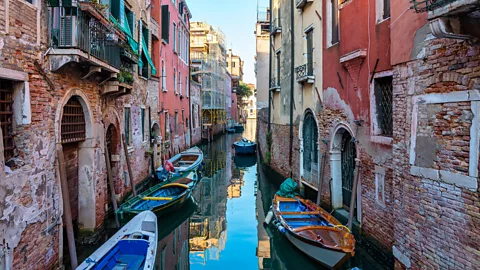 Getty Images
Getty ImagesAnd finally, the other big no – the one that always makes me involuntarily smile – is no swimming, because as Venturini explains: "Venice is an art city, not a beach!"
Once upon a time, however, Venetian children did swim in the canals; you can see them at minute three in the dreamy short film I Nua ("They Swim") that won an award at the 1950 Venice Film Festival – a flock of them joyously mocking the Do Not Swim sign and diving headfirst into canals with water as clear as it was during Covid. The main difference is that Venice had 147,000 residents in 1950 and was full of children; now the population is reduced by two-thirds and it's hard not worry about its future.
"The problem is that a city turns to tourism when it doesn't have any other damn thing left," says D'Eramo, author of The World in a Selfie. D'Eramo believes that if historic centres have other flourishing activities and businesses, like London and Paris, tourism won't feel so overwhelming; it will be just one part of life and residents won't feel robbed of their space or pushed away. Gasparinetti agrees and offers a very fitting metaphor. "In Venice, we have a very well-known drink which is called the Spritz, made of a third [of wine], a third [of Aperol] and a third [of sparkling water]," he says. "Tourism must be part of a winning formula, like the Spritz formula."
Since we finally made it to cocktails, it's time to ask the tough questions. Specifically, we need to talk about who arguably has been Italy's steadiest boyfriend: the American tourist, with whom Italy has shared a very long and often cinematographic love story, from The Talented Mr Ripley to Anita Ekberg swimming in the Trevi fountain all the way to George Clooney's house on Lake Como.
Lalli has no doubt: "Italy continues to have a love relationship with the American tourist. It's a fantasy, but also a reality," she says. "It's the tourist who brings a lot of money, who spends, who wants to have fun on holiday and therefore continues to be very important for us."
Santanchè takes it one step further and goes for an unbridled love declaration: "Come to Italy, because I know how much you love our nation, our lifestyle, our food, our culture, our beauty. I thank all Americans, because if tourism did so well in Italy last year, we owe a lot to the USA and its citizens".
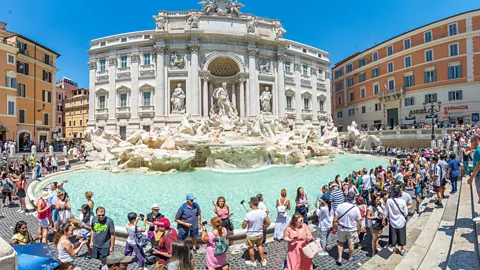 Getty Images
Getty ImagesI hope the Americans reading this are blushing right now. But what about all the other visitors to Italy? In that case, the same question prompts pragmatic, psychological and romantic answers. D'Eramo suggests that tourism should be regulated and handled like any other heavy industry, because it involves infrastructure, transportation and has an impact on the environment.
Lalli hypothesises that if Italians haven't taken to the streets to protest overtourism like the people from the Canary Islands did a month ago, it's because Italians are historically used to things not being perfect, and therefore they've developed a different mindset: they protest less, and find ways to make do.
And finally, Gasparetti wishes that visitors wouldn't just come to look at monuments, but actually try to understand, respect and ultimately fall in love with the soul and culture of his city, which is, he says, "probably the last surviving lagoonal civilisation in the world".
None of them mention a breakup though, and in these cases it's often better not to ask twice. I guess we are good, then.
--
If you liked this story, sign up for The Essential List newsletter – a handpicked selection of features, videos and can't-miss news, delivered to your inbox twice a week.
